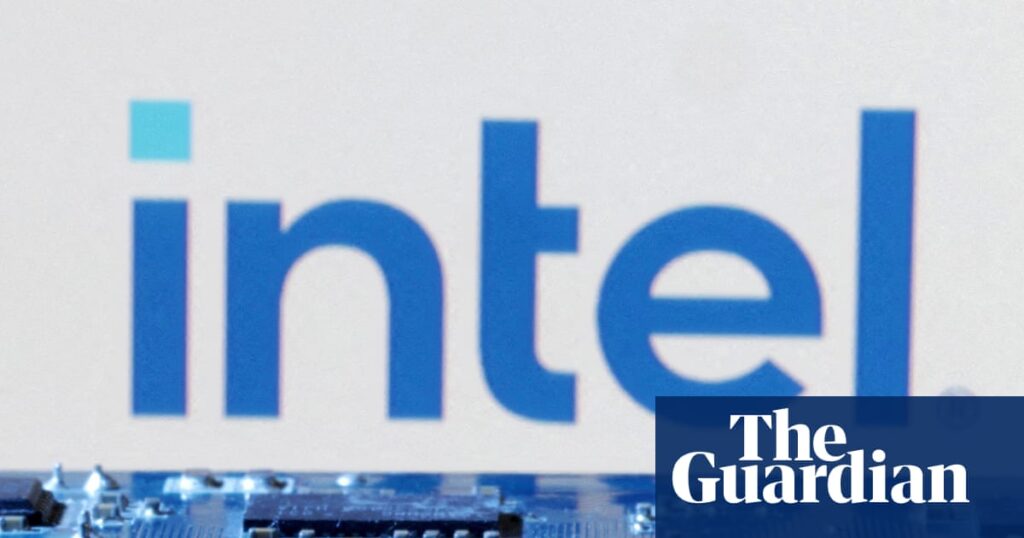The US government has taken an unprecedented 10% stake in Intel under a deal with the struggling chipmaker and is planning more such moves, according to Donald Trump and the commerce secretary, Howard Lutnick, the latest extraordinary intervention by the White House in corporate America.
Lutnick wrote on X: “BIG NEWS: The United States of America now owns 10% of Intel, one of our great American technology companies. Thanks to Intel CEO @LipBuTan1 for striking a deal that’s fair to Intel and fair to the American People.”
Trump met with Lip-Bu Tan on Friday and posed for a photo with Lutnick. The development follows a meeting between Tan and Trump earlier this month that was sparked by the US president’s demand for the Intel chief’s resignation over his ties to Chinese firms.
“He walked in wanting to keep his job and he ended up giving us $10bn for the United States. So we picked up $10bn,” Trump said on Friday.
While Trump did not provide detail on the $10bn, the equity stake is about equal to the amount Intel is set to receive in grants from the government under the Chips and Science Act to help fund the building of chip plants in the US.
The Intel investment would be the latest of several unusual deals struck by the Trump administration with US companies, including agreeing to allow the AI chip giant Nvidia to sell its H20 chips to China in exchange for the US government receiving 15% of those sales. Chipmaker AMD struck a similar deal.
The Pentagon is also slated to become the largest shareholder in a small mining company to boost output of rare-earth magnets and the US government negotiated for itself a “golden share” with certain veto rights as part of a deal to allow Nippon Steel to buy US Steel.
The US government’s broad intervention in corporate matters has worried critics who say Trump’s actions create new categories of corporate risk.
Trump’s move follows a $2bn capital injection from SoftBank Group in what was a major vote of confidence for the troubled US chipmaker in the middle of a turnaround. Daniel Morgan, senior portfolio manager at Synovus Trust, said Intel’s problems were beyond a cash infusion from SoftBank or equity interest from the government.
“Without government support or another financially stronger partner, it will be difficult for Intel foundry unit to raise enough capital to continue to build out more Fabs at a reasonable rate,” he said, adding Intel “needs to catch up with TSMC [Taiwan Semiconductor Manufacturing Company] from a technological perspective to attract business”.
A 10% stake at current share prices would be worth roughly $10bn. Lutnick said this week any stake would be non-voting, meaning it would not enable the US government to tell the company how to run its business.
after newsletter promotion
Federal backing could give Intel more breathing room to revive its loss-making foundry business, analysts said, but it still suffers from a weak product roadmap and challenges in attracting customers to its new factories.
Tan, who took the top job at Intel in March, has been tasked to turn around the American chipmaking icon, which recorded an annual loss of $18.8bn in 2024 – its first such loss since 1986.
Quick Guide
Contact us about this story
Show

The best public interest journalism relies on first-hand accounts from people in the know.
If you have something to share on this subject you can contact us confidentially using the following methods.
Secure Messaging in the Guardian app
The Guardian app has a tool to send tips about stories. Messages are end to end encrypted and concealed within the routine activity that every Guardian mobile app performs. This prevents an observer from knowing that you are communicating with us at all, let alone what is being said.
If you don’t already have the Guardian app, download it (iOS/Android) and go to the menu. Select ‘Secure Messaging’.
SecureDrop, instant messengers, email, telephone and post
If you can safely use the tor network without being observed or monitored you can send messages and documents to the Guardian via our SecureDrop platform.
Finally, our guide at theguardian.com/tips lists several ways to contact us securely, and discusses the pros and cons of each.

